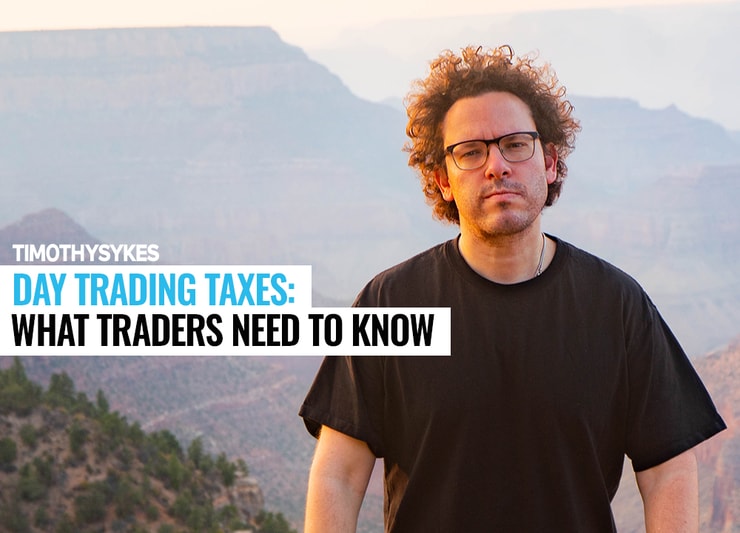Like it or not, as traders, we have to pay day trading taxes.
Taxes alone can be stressful … but day traders have more to consider than the average worker. If you’re a trader, you don’t just enter your W-2 details into some tax software and wait for the results.
There’s way more at play when filing your taxes as a day trader. You already know that you have to pay taxes on your trading income, but how do you figure that out? What deductions can you make, if any?
I have a licensed financial adviser who helps me understand these things, and you should too. If you have any tax questions, speak with them. We’ll go over the basics here…

Doing your day trading taxes doesn’t need to be difficult. It’s just like anything else … You have to familiarize yourself with the process. It’s all part of your trading education.
Before we get to the nitty-gritty, here’s an important caveat…
This communication doesn’t establish a professional relationship for accountancy, tax advice, legal, or any other professional service. Any information presented in our communication with you (including, but not limited to, website content, social media content, video content, printed material, audio content, emails, or any other content) regarding any issues should not be construed as advice as it pertains to tax matters, legal matters, or any other matters. Always consult the advice of a professional licensed in your state or jurisdiction before making decisions on tax or legal matters.
Now, let’s do this!
Table of Contents
- 1 Important Terms to Know: Day Trading Taxes
- 2 How Does Day Trading Affect Taxes?
- 3 Tax Day: The Basics of Day Trading Taxes
- 4 Trader or Investor: Know the Difference
- 5 How Do Day Trading Taxes Work on Robinhood?
- 6 Can Day Traders Avoid Taxes?
- 7 Should I Use a Day Trading Tax Software?
- 8 Frequently Asked Questions About Day Trading Taxes
- 9 Trading Challenge
- 10 Conclusion
Important Terms to Know: Day Trading Taxes

There are a few basic terms you need to know. You’ll see these when you file your taxes, so you might as well understand what they mean.
Capital Gains
If you made money from buying or selling securities, those profits are your capital gains.
Capital gains are taxable income, and you have to report it as such. Pretty simple.
Capital Losses
Capital losses are the opposite of capital gains.
When you lose money from buying or selling a security, that’s a capital loss, and it can be deductible. The amount you can deduct depends on your tax status. (More on that in a bit.)
More Breaking News
- Compass Pathways Shares Surge After Major Depression Therapy Breakthrough
- Key Takeaways
- ULS Stock Soars Amid Potential Market Expansions and Strategic Moves
- MSGS Shares Surge Amid Optimistic Earnings Forecasts
Cost Basis
Your cost basis is the value used to measure profit and loss. It’s the amount you pay (including commissions) for a security.
If you close your position at a value higher than your cost basis, it contributes to your capital gains. The opposite is a capital loss.
Earned Income
Earned income does NOT include income from trading. It’s income from full-time or part-time work, like salary, tips, bonuses … you get the idea.
Since trading income isn’t ‘earned’ income, you don’t have to pay self-employment taxes. That can save you some money. But if you don’t pay those taxes, you aren’t contributing to Social Security — and you have to do that to qualify for U.S. retirement benefits.
Investment Income
Dividends, interest, royalties, annuities — any money you make from property held for investments before deductions is investment income.
Capital gains can count toward your investment income, but only if you choose to include them.
The Wash-Sale Rule
The IRS created the wash-sale rule to prohibit traders from claiming a loss on the sale of a security in a wash sale.
What’s a wash sale? That’s when you trade a security at a loss, then buy one that the IRS considers ‘substantially similar’ within 30 days.
The good news here is that there’s a special exception to this rule. Stay tuned for that.
How Does Day Trading Affect Taxes?

Day trading doesn’t come with a tax-free card. Part of trading is understanding taxes on all capital gains and losses.
Your tax rate will change based on how much you made in the past year in trading profits. Typically, the more you make, the more taxes you’ll have to pay. Something to consider: Short-term positions come with higher taxes than long-term positions.
You can pay taxes quarterly instead of annually. It’s not a bad idea to look into this — with the help of a professional.
I started paying quarterly taxes in college because I was having so much success in the stock market.* You can read all about that in my book, “An American Hedge Fund.” Get your copy here to learn how my time trading in college shaped my trading today.
(*Please note: my results are not typical. I’ve spent years developing exceptional skills and knowledge. Always remember trading is risky. Never risk more than you can afford.)
It’s never a bad idea to study up and prepare for taxes so you’re less stressed when tax season arrives. If you’re unprepared, you’re setting yourself up for failure.
People want guarantees in the markets/life, but that’s not reality…the only guarantee in finance is that you’ll lose if you come to the battlefield unprepared like most. The only things certain in life are death & taxes so do everything you can to build your dream life & enjoy!
— Timothy Sykes (@timothysykes) February 26, 2021
Tax Day: The Basics of Day Trading Taxes

OK, now let’s talk about filing taxes. For the most part, it isn’t too complicated. Especially if you aren’t classified as a trader with the IRS.
Long-Term vs. Short-Term Investments
Different types of stock holdings are taxed at different rates.
Short-term investments are positions that you hold for less than a year. These are taxed at the normal income rate. For example, the short-term income tax rate for gross annual income between $37,951 and $91,900 would be 25%.
Long-term investments are any positions that you held for over a year. Using the same income range as above, the long-term tax rate would be 15%.
Keep Separate Accounts
It’s smart to separate your long-term holdings from your short-term investments. There are a lot of reasons for this…
First, it’s just easier. For accounting purposes, it can make your life simpler. Beyond that, the IRS requires traders to divide their long-term and short-term investments into different brokerage accounts when trading the same issues.
Also, you want to make sure you classify as a trader with the IRS. Combining your investments could disqualify you from getting this designation.
Here’s another legal note…
IRS CIRCULAR 230 NOTICE. Nothing in our communications with you (including, but not limited to, website content, social media content, video content, printed material, audio content, emails, or any other content) relating to any federal tax transaction or matter are considered to be “covered opinions” as described in Circular 230.
Capital Gains & Capital Losses
We already talked about what these terms mean … Now it’s time to learn how to report your capital gains and losses on your taxes. It’s not as straightforward as you might think, and it involves a few different forms.
Forms
Which forms you need depends on whether you made the mark-to-market election last year. (I’ll talk about that more in a sec.)
If you’re a new trader, you probably didn’t. You’ll need to report your capital gains and capital losses on Form 8949 and Schedule D.
Trading expenses go on Schedule C. This form doesn’t reflect your revenue, so it looks like you’re reporting a loss. You can include a statement indicating that your net trading gains are shown on Schedule D.
Trader or Investor: Know the Difference
The IRS sees everyone who trades as either a trader or investor.
You might not think it’s an important distinction, but people who qualify as traders can potentially save money on taxes.
Are You a Trader?
How do you know if you qualify for these tax benefits? That’s the tricky part.
The IRS couldn’t be vaguer in its explanation of the requirements. The IRS says your trading activity has to be substantial and consistent. And that’s as specific as it gets.
You can probably see why this presents some problems. Taxes are serious business — don’t make any assumptions. There have been several court cases on the topic.
Substantial, Constant Activity
The primary requirement is that you spend a lot of time trading and that you do so consistently.
There’s no set number of hours — but the more, the better. If you don’t have a job and you trade full time, that helps. It’s harder to argue that you aren’t a trader if that’s how you make a living.
You can also be a part-time trader, but you should be making several trades weekly in that case.
Did You Make a Profit?
Turning a profit might not be a requirement, but it can help make your case.
An important thing to remember is that the IRS treats traders the same way it treats businesses. Tax law says businesses should typically be profitable for three years in a five-year period.
Again, this may not be the deal-breaker. Maybe you haven’t even been trading long enough to meet this requirement…
Can You Be a Trader and an Investor?
Short answer: Yes. Longer answer: Yes, but with a caveat.
To be classified as a trader, your goal should be to profit from short-term market movements. Investors make money from dividends and long-term gains. If you hold several long positions, it can weaken your case as a trader.
To be both a trader and investor, you should separate your long-term positions. That means you identify them in your records on the day you purchase them.
If you meet all of these criteria, there’s a good chance you qualify as a trader. If so, congratulations — you just might save some cash.
How Do I Check My Trader Tax Status?
Make sure you go through each question thoroughly to see whether you meet the IRS requirements for a trader tax status (TTS).
You might qualify for day trader tax status one year, but miss out on the next year. Make sure you review the requirements each year to verify that you’ll still qualify as a trader.
No one wants the IRS knocking on their door because they misread the TTS requirements…
Schedule C Deductions: Tax Deductions for Day Traders
Bonus for those of you who qualify as traders: The IRS sees traders as self-employed buyers and sellers of securities.
Just like any other sole proprietor, you can deduct your trading-related expenses on Schedule C.
These deductions will reduce your adjusted gross income. This means you could potentially qualify for more tax breaks.
Mark-to-Market
One of the great things about trader status: the mark-to-market election.
If it’s your first year filing taxes as a trader, this probably doesn’t apply to you. But keep reading — you might be able to reap the benefits next April.
Here’s how it works: On the last trading day of the year, you ‘pretend’ to sell and repurchase your entire portfolio. You record your imaginary gains and losses and start the new trading year with no unrealized gains or losses.
The mark-to-market election has some great advantages.
First, you’re exempt from the wash-sale rule. This can save you a ton of bookkeeping trouble. And that frees up time to focus on trading.
Next, remember how I mentioned earlier that the amount you can deduct in capital losses depends on your tax status…
Most people can only deduct up to $3,000 in net capital losses each year. This limit doesn’t apply to mark-to-market traders. Mark-to-market traders can deduct an unlimited amount of capital losses.
You might not like to think that you’ll lose enough for this to matter, but it happens all the time. In a bad year, this might help undo some of the damage.
Forms for Mark-to-Market Traders
As a mark-to-market trader, the IRS allows you to report all your capital gains and capital losses as business property. You should do this on Part II of IRS Form 4797.
How Do Day Trading Taxes Work on Robinhood?
Robinhood will send you a consolidated 1099 form at the end of each year — as long as you’ve sold any investments, made over $10 on dividends, and/or made over $600 in free referral stocks.
If you’re a day trader, you’ll likely meet these criteria.
No, Robinhood won’t do your taxes for you. If you have questions about your tax forms, consult a professional.
Can Day Traders Avoid Taxes?

No…
But there are a couple of ways that day traders can minimize how much they owe on taxes. Qualifying for TTS and using Schedule C deductions may help.
Don’t put too much effort into researching how to save a few tax dollars. I’d rather consult a licensed professional who knows what they’re talking about. Spend your time studying the stock market and preparing for the next trade.
StocksToTrade can help you prepare for the markets every day. I helped design this trading and scanning platform to suit my penny stock strategies. It has 40+ built-in scanners, killer charts, and more. Get your 14-day trial here and get scanning!
Should I Use a Day Trading Tax Software?
Day trading tax software is specialized accounting software for traders and investors. It can make doing your taxes easier and faster. Not all traders need to use it, but it might be something to consider.
The most important thing to look for in a day trading tax software is IRS compliance. If the software doesn’t meet IRS standards, you’ll be setting yourself up for problems.
After you find one that works, check out the other features and select one that’s right for you. You’ll most likely want one that can consolidate your trading history from all your brokerage accounts into one tax file.
Frequently Asked Questions About Day Trading Taxes

Who Does the IRS Consider a Day Trader?
To the IRS, traders are those who seek to profit from daily market movements, trade regularly, and have spent substantial time trading. The requirements are vague, so if in doubt, consult a licensed professional.
How Much Could I Pay in Taxes as a Day Trader?
That depends on how profitable you are. If you end up in the highest bracket, making $418,401 or more, you’ll be taxed 39.6%. Most traders don’t make that much. Check what tax rate you fall under based on your profits. Or, again, consult a professional tax expert.
Do Day Traders Pay Estimated Taxes?
If day traders are profitable, it may be wise for them to pay quarterly taxes or estimated taxes. That way they won’t owe an estimated tax penalty. A broad rule is to ask yourself if you’ll owe more than $1,000 in taxes at the end of the year. If so, you might want to consider paying estimated taxes or quarterly taxes. A tax pro can help you figure out estimated payments.
Is There Any Tax on Intraday Trading?
Yes. Profits from intraday trading are considered short-term capital gains. If you live in a country other than the U.S., the rules will be different. Check with your country’s tax authority to see which rules you need to follow.
How Is Day Trading Taxed in the U.K.?
Tax on trading profits falls into three main categories in the U.K.: speculative, private investor, and self-employed trading activity. Each category has its own parameters. If you’re in the U.K. and have questions about your day trading taxes, contact HMRC for clarification.
Trading Challenge
Maybe you had a down year and you’re ready to revamp your strategy. Maybe you want to learn how to make the jump from casual to full-time trader. The new tax year is a great time to start.
I’ve been trading for decades — and I’m completely self-taught. Now I take what I’ve learned throughout the years to teach others how they can prepare to enter the markets. I want to be the mentor I never had.
If you’re ready to take your trading to the next level, apply to join my Trading Challenge. You’ll be part of an awesome community of dedicated traders as you develop new strategies as you learn to manage risk in this constantly changing market.
If you’re serious about finding your way in the markets and you’re ready to put in the work, apply to the Trading Challenge today.
Conclusion
I’ve just given you a lot of information to help you prepare for tax day. But everyone’s circumstances are different … Don’t hesitate to get professional guidance on your day trading taxes.
It’s important to get taxes right. No one likes to be on the wrong side of the IRS … Do your research, talk to a professional, and keep clear records.
What’s your plan for handling day trading taxes? What are your strategies to make this year better than the last? Let me know — leave a comment!








Leave a reply